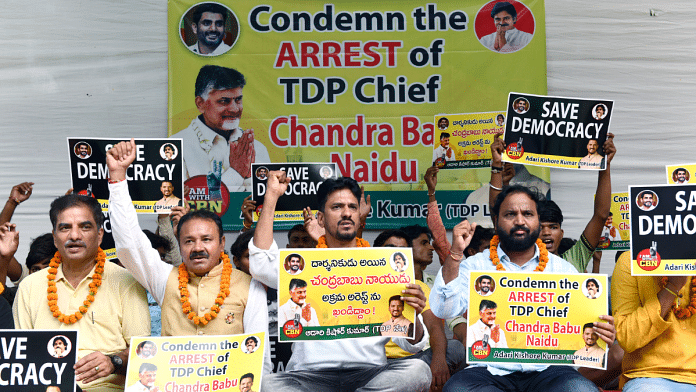New Delhi: The Andhra Pradesh High Court Friday refused to quash the FIR against former chief minister Chandrababu Naidu in the skill development corruption case, saying that the investigation was at the “fulcrum of completion” and the Centre’s approval was not required to probe his role in the matter.
The high court said this while hearing a petition filed by Naidu, the Telugu Desam Party (TDP) chief, where he sought the quashing of the 2021 FIR which was filed by the Andhra Pradesh Criminal Investigation Department (CID).
Naidu is charged under various sections of the Indian Penal Code (IPC), including those for criminal conspiracy and cheating and the Prevention of Corruption Act (PCA). He was arrested 9 September and his remand was later extended.
Representing the 73-year-old politician, senior advocates Harish Salve and Siddharth Luthra argued that his arrest was not in accordance with the law as the necessary consent under the law was not taken and that it must be set aside as there was no prima-facie case against him.
However, the high court said that it would not interfere at this stage as the investigation is at a final stage. It did not find merit in Naidu’s contention that Centre’s consent was needed under the PCA to proceed against him, thus giving the green light for the probe to go on.
Also Read: ‘All proof of him being kingpin of skill development scam,’ says Andhra CM Jagan on Naidu’s arrest
‘No consent taken, regime revenge investigation’
In the high court, Salve and Luthra contended that Section 17A of the PCA had not been complied with in the case.
Introduced in 2018, Section 17 mandates that before proceeding against a public servant, the permission of the Centre be sought if the alleged offences relate to discharge of official functions or duties.
This, the senior advocates said, was a “regime revenge investigation” against the former chief minister. The criminal law was being “weaponised” in a clear abuse of the law, they contended.
They further argued that there was no prima-facie case against Naidu and added that the question of his fleeing away did not arise.
Appearing for the CID, senior counsel Mukul Rohatgi contended that the proceedings cannot be quashed as the investigation is at a nascent stage. He said that a huge scam had been unearthed and that Naidu was only added as a result of such investigation.
Rohatgi rebutted Naidu’s contentions relating to the anti-corruption law, saying that since this was a “calculated and deliberate scam”, the provision will not apply as it is unrelated to the chief minister’s official duties.
The CID counsel also contended that because the amendment was introduced in 2018 and the inquiry began prior to it, the provision was not applicable in this case.
Additional Advocate General P. Sudhakar Reddy, who appeared for the Andhra Pradesh government, added that the PCA amendment was only prospective in nature. So, it would not apply to inquiries that commenced prior to the changes made in the anti-corruption law, he said.
Agreeing with the contentions of the CID and the government, the court held that consent under the corruption law is not required in the present case since the preliminary inquiry precedes the amendment.
Since the new requirement of consent was introduced via an amendment and the law does not specify that it will apply to previous events, Section 17 would not be applicable, the court said.
Further, it added since the former chief minister’s alleged actions are unconnected with his official duties or functions, the provision is inapplicable regardless of the lens it is considered from.
“Viewed from any angle, Section 17A of the PC Act would not be applicable to all the cases which occurred before 26.07.2018 (date of amendment),” the court observed, noting that no approval was required in the present case.
It added that the approach has to be different when considering serious economic offences such as the present case.
The judges also noted that considering the stage of the investigation, the court should not interfere with the proceedings when it was at the fulcrum of attaining finality.
“Investigation in so far as petitioner is concerned, it is at nascent stage, and at this stage, this court should not interfere with the proceedings in a petition under Section 482 CrPC,” the high court said, noting that it cannot conduct a mini-trial.
Akshat Jain is a student of the National Law University, Delhi, and an intern with ThePrint.
(Edited by Tony Rai)
Also Read: The ‘Rs 3,300-cr govt deal & skill development project’ behind Andhra ex-CM Chandrababu’s arrest



